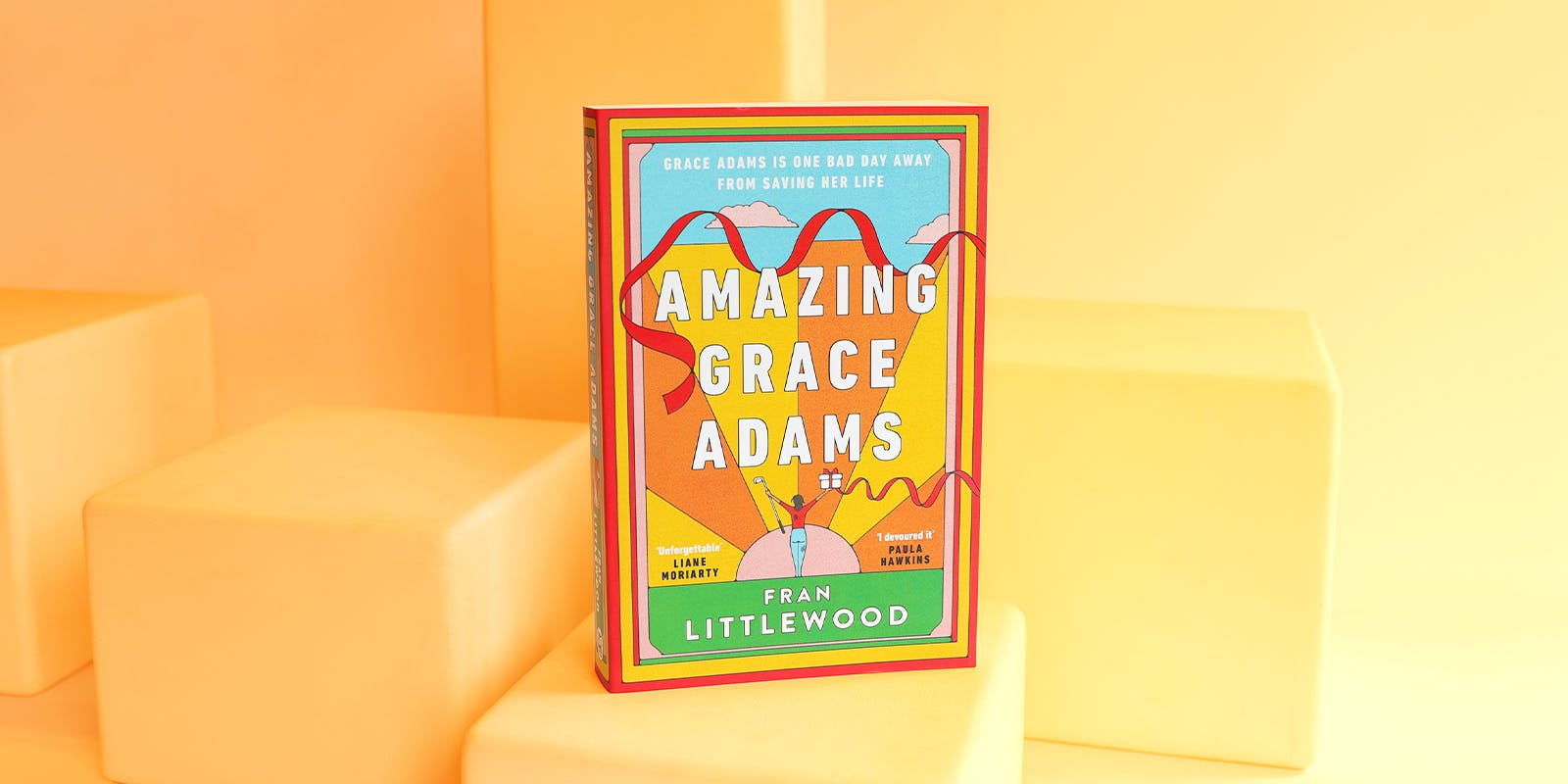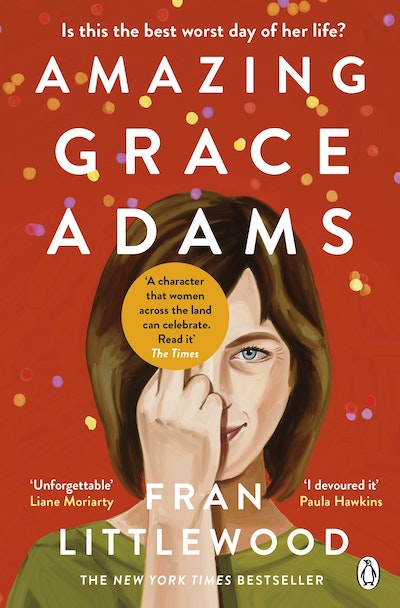Fran Littlewood, author of ‘Amazing Grace Adams’ shares how Covid chaos propelled the writing and publication of her debut novel.
What was your writing process like for Amazing Grace Adams? Did you have a writing routine or any regular rituals?
I wrote the book in lockdown, including at the point when we were only allowed out of the house for an hour a day. It was a heatwave over here, which was fitting since the book opens on the hottest day of the year - and our neighbours (who had moved out for the duration) were re-modelling their house from the ground up, including pneumatic drilling, the works. And we were home-schooling three children, two of them teenagers (and trapped…) at the time.
Everything was amplified and it all felt very acute. So it wasn’t difficult to get into Grace’s headspace. I wrote the book all over the house, but mostly at the kitchen table and in my bedroom. There was a moment when I was writing on the doorstep, trying to escape it all. It was a cathartic write. A cry for help!
In terms of rituals, I usually made chamomile tea before starting work, to calm the creative dread…
How did you first come up with the idea for the book?
I would love to be able to say that, like Grace, I abandoned my car in gridlocked traffic one day, and walked away without a backwards glance… Sadly, that didn’t happen! The fact was, I wanted to write a midlife heroine. Something that was a corrective to the prevailing narrative that women at this point in their lives are downtrodden and boring and over the hill - a kind of re-branding. I felt so strongly that I didn’t want to misrepresent the women around me. I didn’t want to write something vanilla or sanitised.
I also wanted to inject some humour into it, which is where the idea for the day from hell came in. Grace is having one of the worst days of her life. She’s pretty much lost everything. But instead of breaking down, she rises up, finally. She rips up the social contract, and goes out and says and does all the things we only dream of doing. She’s basically my fantasy self!
For a long time, I called this my book about a perimenopausal woman going on a rampage across north London, but happily, it became much more than that - a far broader exploration of family and identity, love and womanhood, the ambush of age and female rage. Ultimately, it’s a redemptive narrative. There is hope in this book!
How long have you been working on this book?
My agent loved the idea of Grace from a very early one-line pitch, and so she was championing me all the way, which made all the difference. I wrote it pretty intensely as a result - the first draft was completed in just under nine months.
I think the unique circumstances of lockdown just came together to enable that. BUT, I had put in my 10,000 hours before then, learning the craft, and including all the usual rejections, so I almost hate to put a timeframe on it because it isn’t really an accurate reflection of the real time taken. Also, I know those kinds of comments are fantastically annoying to read!
Then there was a long lead time from Grace being acquired in April 2021 to publication in January 2023 - although I’m not entirely sure where that time went because it feels more like a handful of months.
What was the publishing process like?
I did a part-time MA in creative writing at Royal Holloway in London, and at the end of the course, an anthology of writing for that year’s cohort was sent out to agents. My brilliant agent, Hellie Ogden, contacted me on the back of that, a couple of lines of email, to which I had a crazed, animal response - heart beating out of my chest and ending up in the foetal position on the lounge floor! That’s how I remember it felt, at least. Because it was the first time I knew that I might be good enough.
Hellie signed me on a partial manuscript, the book I’d been working on during the course, and when I’d finished and it went out on submission to publishers, the response was ‘nearly but not quite’.
I started a second book, which was a bit like pulling teeth to write, and just as we’d begun to send that out, I pitched the idea of the third. Hellie knew straight away that it was a better bet, more packageable - the first two were ‘quieter’ books. Grace has some dark humour that the others didn’t, and a punchy hook - so, after a couple of days, we decided to abandon the second manuscript! It was the start of lockdown and the world had been turned on its head, so somehow it felt as though there was nothing to lose in this.
Less than a year later, I had another incredible email - this time from Jess Leeke, my wonderful editor/ publisher at Penguin Michael Joseph (UK), who pre-empted Grace.
Do you have a favourite book or author?
This is obviously like asking me to choose my favourite child! Because I would like to pick everything Curtis Sittenfeld has ever written, same with Anne Tyler and Meg Wolitzer and Chimamanda Ngozi Adichie and Jennifer Egan and Alice Munro and Elena Ferrante and Nora Ephron and Helen Simpson, and also The Secret History and Fingersmith and The Night Circus by Erin Morgenstern and Ask Again, Yes by Mary Beth Keane, and The Overstory by Richard Powers and and and…
What inspired you to become an author?
I always loved language and stories - I remember colourful vocab flashcards on the fridge at home like they were sweets. Reading was my escape, my happy place. I would have about eight books on the go at the same time as a child, a gorgeous, teetering stack next to my bed. Rumer Godden and Mrs PepperPot and Bedknobs and Broomsticks and Flat Stanley and The Lion, the Witch & the Wardrobe and The Borrowers and The Secret Garden, and (skipping the politics of it because these were less enlightened times) my One True Love, Enid Blyton. (Fun additional, slightly weak fact: my great uncle once dated Enid Blyton’s daughter. I’m pretty sure this is true…)
I studied English Lit at University and worked as a journalist, and then, after I’d had my children, I decided to do an MA in creative writing in the hope of getting published.
At this point, job-wise, reading and/ or writing books was all I really wanted to do - and I didn’t want to look back a couple of decades down the line and regret never having tried.
What did you want to be when you grew up and why?
Julie Andrews, obviously. I saw an amateur production of The Sound Of Music when I was maybe eight - and it was like I’d discovered the secret! I lobbied hard to get the star part in the class play after that and wore the teacher down. I played a missionary (it was a Church of England school), and there was no Captain Von Trapp, no singing, and no lols whatsoever, but it was my main character moment and I did not care! I would have played a piece of rotten fruit - and in fact, once did, in a local Saturday morning drama group production…
If you could go back in time and give your past self one piece of advice, what would it be and why?
Wear the yellow shoes.
I canvassed my kids for this one - of all the wise advice I’ve bestowed on you etc… and my middle daughter came up with this instantly. It’s a story from my early teenage years.
I’d bought a new pair of shoes, yellow with espadrille soles and a buckle - a bold choice, yes. And I loved them with my whole heart. The first day I wore them, I met up with my friend down the road who I cycled to school with. She loved my new shoes. Halfway to school, we met up with another friend. She also loved my shoes. Before we set off again, I looked away from the two of them for a second, at a passing car maybe, and then back - and I caught them sharing a sniggering look.
Turned out they did not like my yellow shoes, and I never wore them again. But I tell my kids I should have because damn I adored those shoes. I should’ve ploughed my own furrow, as we all should - especially women and girls - and never mind what anyone else thinks.
What is the best writing lesson/ tip you ever received?
That prose should ‘look like water, taste like gin’. This is from Andrew Motion, former poet laureate, who taught me for part of my MA in creative writing at Royal Holloway. He was all about weeding out the overwriting, which I very much needed since at the time I was a ‘why use one metaphor/ simile when you can use ten’ kind of writer. Also! I love doing descriptions, everyone is definitely gonna want to read ALL these descriptions.
I took his advice to mean, the writing should appear simple but actually be painstakingly constructed. Clean, precise and shot through with, for example, an unexpected but perfect verb that’s doing a lot of heavy lifting. Sentences that slap! Original language. No words wasted. That’s the goal…













